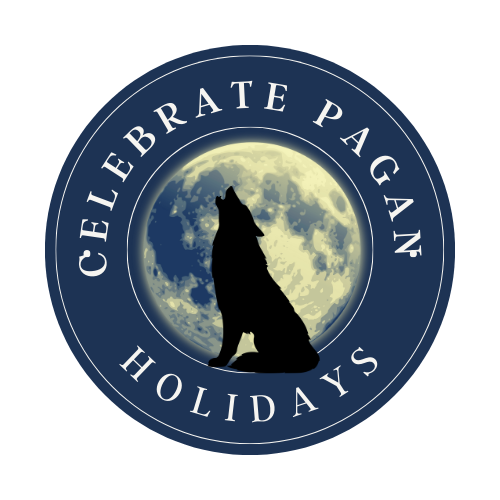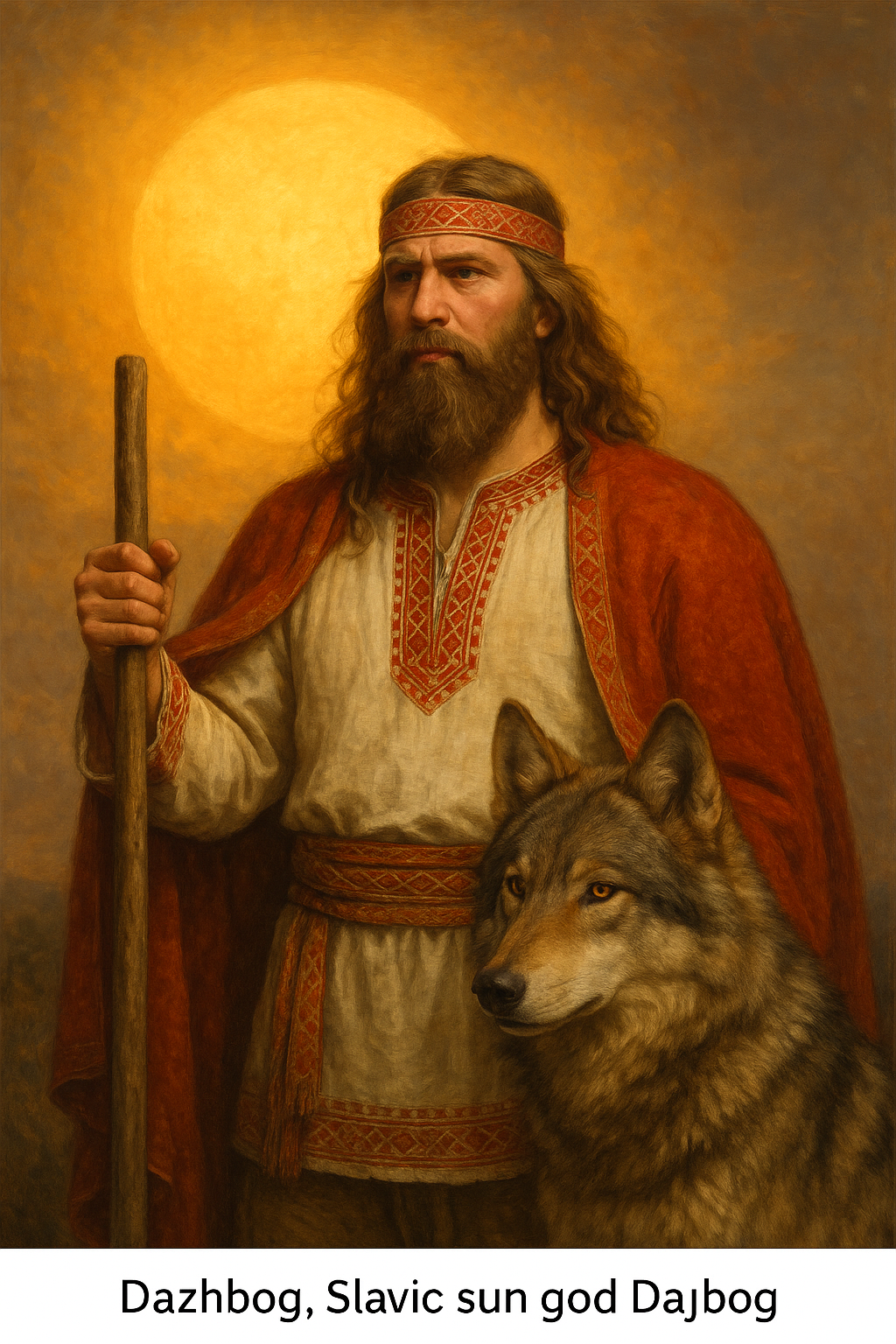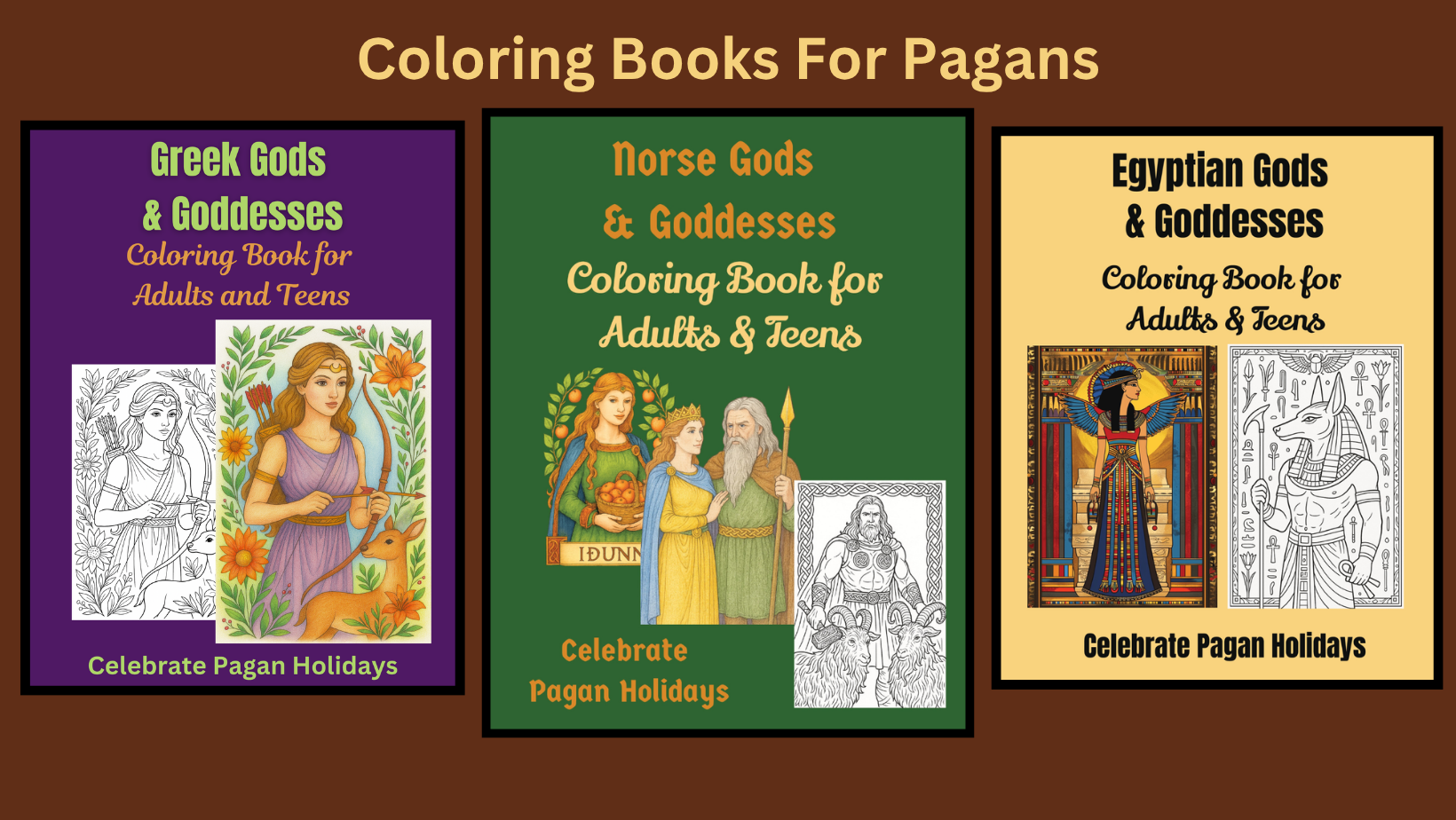Dajbog, also known as Daybog or Dazhbog, is one of the more important deities in the Rodnovery & Slavic pantheon. A sun god, a giver of prosperity, and a patron of life and warmth. His name means “the giving god” or “god who gives,” and that generosity was central to how the Slavic people viewed him: as a bringer of light, wealth, and vitality to the world.
Animals, as a crucial part of nature, also have a significant place in Rodnovery. Their impact on all aspects of our lives throughout the ages can’t go without notice, and in Rodnovery they receive special praise! Dajbog is connected to Wolves and they have their place in the celebration.
In this article, we will go deeper into Dajbog and Rodnovery pagan's connection to nature, as the core of the religion and tradition is mostly naturalistic.
Days of Wolves
According to the Rodnovery calendar I (Marko) follow, Days of Wolves are celebrated for one week, starting on November 5th and ending on November 11th with the Day of Dajbog. Like most Days of Animals festivals, they end with a deity celebration.
Days of Wolves are a celebration of the Cult of the Ancestors. It’s believed that souls of our ancestors, or souls of the dead, briefly come to visit Yav in the form of wolves.
During this period wolves are praised more than anything, up to the point that our ancestors even made sacrifices to them. Sacrifices were mostly in the form of mutton or bread, sometimes even animal sacrifices. In this way, you invite the wolf into your home to eat with you and try to earn its favor not to come again during winter to kill your livestock.
With this kind of sacrifice, it’s believed that you are also feeding the souls of your ancestors and earning their favor in Prav. This was a recurring event during the festival until the last day called Rasturnyak (Dispersion), the last time you let wolves eat with you before winter.
According to the Rodnovery beliefs, Dajbog gathers the wolves on Dispersion and leads them in one final hunt. In the old days, if this tradition wasn’t honored, people believed that wolf attacks on livestock during winter would be worse.
Do love coloring, calming activities or creating grimoire pages. Check out my pagan coloring book series. Available on Amazon in paperback and in the website store as PDF. Greek, Norse, & Egyptian so far!
How Are Days of Wolves Celebrated Today?
Modern times are very much different, and also wolf populations are far less in numbers than a thousand years ago, so people do not give animal sacrifices.
In recent tradition, women would hold off on wool knitting, and you would not wear any wool clothes at this festival. Wool symbolizes sheep, and sheep were the sacrificial animals traditionally, so you do not want to offer yourself as a hypothetical sacrifice to wolves.
In some parts during this festival men would stuff a wolf pelt stuffed with straws or dry grass and parade it through a village, singing songs in honor of wolves and our ancestors.
During the last day of the festival, at night, the head of the house would bake a sacred bread and stand on the doorstep of the home and offer the bread to wolves and Dajbog, and then share the blessed bread with the family.
Significance Of The Wolf In Rodnovery
Cult of the Wolf has a really special place in my Slavic culture. In Rodnovery mythology it is believed that certain groups of Slavic people were descendants of certain mythical animals.
The most known connection between a Slavic people and an animal is of course the famous Bears and Russians. In the same way, my people in the South were believed to be descendants of Wolves. They are our mythical relatives or the mythical representatives of my people.
The deity connected to wolves is, of course, Dajbog. He is believed to be the main deity and protector of my people and has a special place in my culture.
According to some interpretations of medieval texts, Dajbog was said to ride across the sky in a chariot drawn by wolves. These celestial wolves guarded and accompanied the sun on its daily journey, ensuring its rebirth each morning. The image of the “wolf chariot” also reflects the idea that light and shadow are inseparable and that even the fiercest predator has a place within the harmony of nature.
Who Is Dajbog?
Dajbog, also known as Daybog or Dazhbog, is a Rodnovery deity who gives life to the Earth. He is the solar deity, the God of the Sun, and the deity of rain. Both of these are among the necessary conditions for life itself. Also, he is connected to the Underworld as well, which is his more dominant characteristic among South Slavic people, where I belong as well.
Though familial relations in the Rodnovery Pantheon aren't clear, it’s believed that Dajbog is the son of Svarog, the Allfather of Rodnovery, and the first creation of the primordial God Rod.
In the Primary Chronicle, one of the oldest Slavic historical texts, Dajbog is mentioned alongside other gods like Perun (thunder) and Mokosh (earth and fertility). Read my article on Mokosh.
Chroniclers referred to the early Slavs as “the grandchildren of Dazhbog,” which implies he was considered a divine ancestor — a source of light, lineage, and divine spark within humankind.
Read about another Sun God, Helios
The Meaning of His Name and Symbolism
The etymology of Dajbog (from daj “to give” and bog “god” or “fortune”) makes his essence crystal clear — he is the god who gives blessings. In Slavic culture, bog also meant wealth or good luck, and its root appears in modern Slavic words like bogatstvo (riches) and bogaty (wealthy).
Therefore, Dajbog wasn’t just a solar being but a divine provider, associated with abundance in both material and spiritual forms. His rays were blessings falling upon the earth, ripening the fields and awakening vitality in all living things.
Symbolically, Dajbog’s attributes include:
The Sun Disk — representing his chariot or radiant power.
Fire and Gold — sacred metals and colors associated with warmth, divine light, and royal strength.
The Wolf — his mythical companion or manifestation, linking him to cycles of light and darkness.
The Wheel — an ancient solar symbol, showing the eternal rotation of the sun and the seasons.
Together, these symbols remind us that Dajbog governs the cycles of life, from dawn to dusk, and from spring’s renewal to winter’s retreat.
Correspondences
Symbols: Chariot, Sun wheel, Golden disk, Wolf
Culture: Slavic
Day of the Week: Sunday
Season: Summer
Color: Gold, Orange, Red
Divination: Tarot - The Sun
Elements: Fire & Air
Animals: Eagle, Horse, Wolf
Plants: St. John’s Wort, sunflower, calendula, chamomile
Stones: Citrine, amber, goldstone, pyrite
Consort: Slavic moon goddess Mesyats and fertility goddess Ziva
Why Is Dajbog More Significant Amongst Southern Slavs?
Dajbog is considered to be the first ancestor of one of the South Slav people, but in recent times he is believed to be the first ancestor of all the Slavic people in the world. He is imagined to be an old man, wearing animal hide, with a walking stick. His description resembles the one of a druid. He is always in the company of an old lone wolf.
The Wolf and Dajbog are an unbreakable connection. That is the reason that both wolves and Dajbog are considered the first ancestors of my people.
How Was Dajbog Celebrated?
Dajbog is one of the deities in Rodnovery culture celebrated with animal sacrifice. Usually, a roster was sacrificed in honor of Dajbog on his day. The sacrifice was performed by a Volhv, or a head of a family, on the doorsteps of the house.
If you’re not familiar with what a Volhv is, you can find the answers in our article Introduction to Rodnovery.
How Do I Celebrate Days of Wolves?
During Days of Wolves, I tend to go on hikes in the mountainside near my town. In these mountains and forests, we can find the Eurasian Wolf, so I hope to glimpse some of them in their natural habitat, at a safe distance. So far, in my 8 years of practice, I believe that I’ve seen them once or twice.
If it’s accessible to me, I would bring some raw mutton with me and leave it at places where wolves are seen during the previous months. Though I don’t know what happens with the meat, I believe I’ve fed the wolves and that I gained their favor and favor of my ancestors in Prav.
Is the wolf your spirit animal? Watch my video to learn more!
How Do I Celebrate Dajbog?
In modern times, animal sacrifices are not a common thing, so that is not an option in my practice. So, on this special day for me and my people, I take the day off work and solely focus my day on Dajbog.
Waking up very early, before the sunrise, is a key part of connecting with our deity. As Dajbog is the deity of the Sun, absorbing the first rays of sunshine is the first step of the connection. The second step is, of course, the prayers during the days directed to the deity.
The third, and final step during this day that I take is baking the sacrificial bread and hosting a feast (dinner) for close family members and friends! Breaking the sacrificial bread is a key part of it, and though I do it alone because I’m the only Rodnovery around, it makes me fully connected to Dajbog and makes the day successful!
As a sacrifice, I leave a piece of bread on a stone plate outside, for Dajbog, and never have I found it untouched in the morning. Most probably it was disturbed by some critters or birds, but they, as a part of nature, are a part of Dajbog as well.
Ways to Worship Dajbog Today
Reconnecting with ancient deities often means finding ways to honor them that fit our modern world while respecting traditional themes. Dajbog’s worship can be joyful and accessible, celebrating the natural cycles that shape our lives.
In contemporary pagan practice, Dajbog may be called upon for:
Energy and vitality when feeling weary or uninspired
Prosperity magic, especially for work related to the sun (gardening, art, leadership, teaching)
Healing rituals that use light and warmth to cleanse emotional or physical pain
Protection from negativity, as sunlight banishes shadows and falsehood
1. Honor the Sun’s Cycle
Since Dajbog is the sun itself, the most direct way to worship him is to live in rhythm with daylight. Wake at dawn to greet the sun; pause at midday to give thanks for its strength; and bid it farewell at sunset.
Simple daily rituals can include:
Standing in the sunlight each morning and saying:
“Hail Dajbog, giver of light and life. May your warmth fill my heart and guide my path.”Lighting a candle in his honor when you need clarity, energy, or positivity.
Journaling gratitude for what “light” you’ve received that day — whether insight, kindness, or opportunity.
Learn about Sun Deities from pagan paths around the world
2. Celebrate Solstices and Seasonal Changes
The summer solstice (around June 21) is the high feast of Dajbog — when the sun stands still in its strength. Ancient Slavs held fire festivals, danced around bonfires, and offered food and flowers to thank him for abundance.
To celebrate today:
Create a small outdoor altar with sun symbols, golden candles, and offerings of honey, bread, or milk.
Burn a fire safely or light a candle as a symbol of the eternal sun.
Gather friends to share food and stories — community celebration is a modern echo of ancient joy.
In winter, when sunlight wanes, honor Dajbog’s endurance by keeping a candle burning through the longest night. It symbolizes faith that warmth will return.
3. Work with Wolves as Spirit Messengers
If Dajbog’s wolves call to you, consider honoring them as spirit guides of intuition and transformation. Wolves teach us to trust our instincts, protect our kin, and move with purpose.
You might:
Keep a wolf figurine or image on your Dajbog altar.
Meditate on the howl of a wolf — a call that bridges earth and sky, night and dawn.
Offer prayers for balance between civilization and wilderness, recognizing that both are sacred.
4. Create a Solar Offering Altar
An altar to Dajbog should reflect his radiant and generous spirit. Include:
A gold or amber cloth
Sunflowers or yellow wildflowers
A candle or small lantern
Bowls of honey, mead, or fresh bread
Symbols of wolves or the sun wheel
During meditation or prayer, visualize sunlight radiating outward from your altar, touching every corner of your home and the world beyond it.
A Simple Ritual to Honor Dajbog
This short sunrise ritual can help you connect with Dajbog’s energy.
You will need:
A candle (gold or yellow)
A small bowl of water
A piece of bread or fruit
A place where you can see the morning sun
Steps:
Face the rising sun. Take three slow breaths. Feel the air warm and brighten as the sun rises.
Light your candle, saying:
“Dajbog, giver of life, I welcome your light. Shine upon my heart and guide my path.”Dip your fingers in the water and sprinkle a few drops toward the sun. This symbolizes the union of fire and water — life’s two sustaining elements.
Offer the bread or fruit to the earth as thanks. Whisper your gratitude for warmth, health, and abundance.
End by standing in silence, feeling the sunlight on your skin. Absorb it as a blessing.
You can adapt this ritual for any day you need clarity, hope, or strength.
Take Away
Rodnovery is all about the community, so take a festival and holiday such as these to connect yourself with your loved ones, whoever they are!
Guest Author, Marko, is a young pagan from Southeastern Europe, specializing his pagan path in his Native Faith called Rodnovery and dwelling into Wiccan solitary practices. Years of research and practice, from a very young age when curiosity blooms, gave Marko a good level of expertise on the topic of the Rodnovery religion.
Updated by Erik Olsen November 7, 2025. You can read more About Us here.








